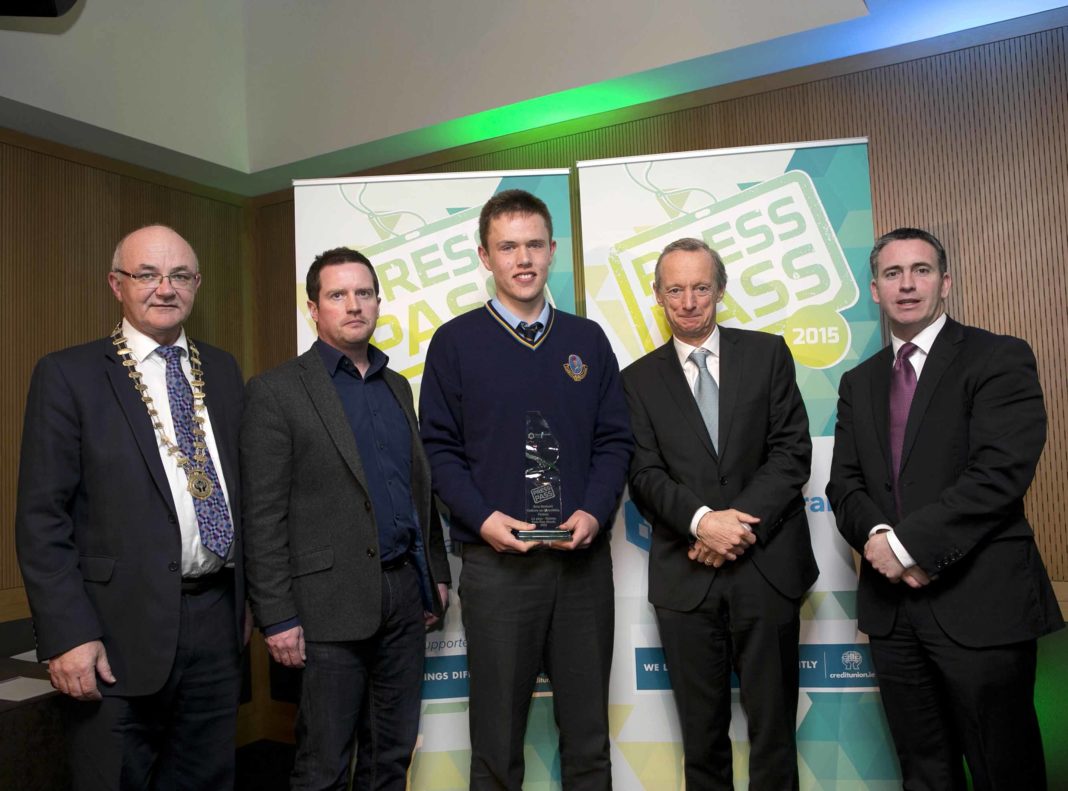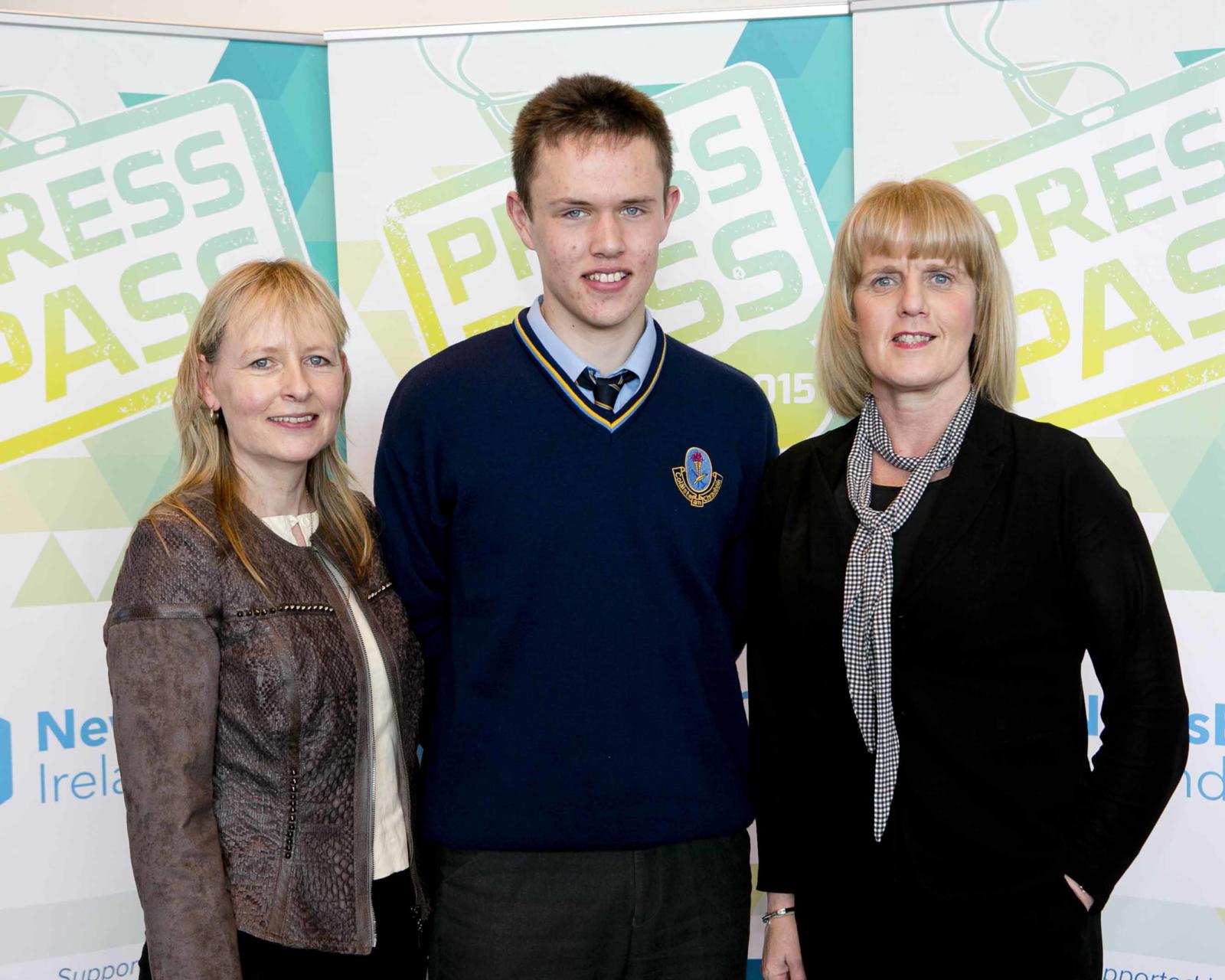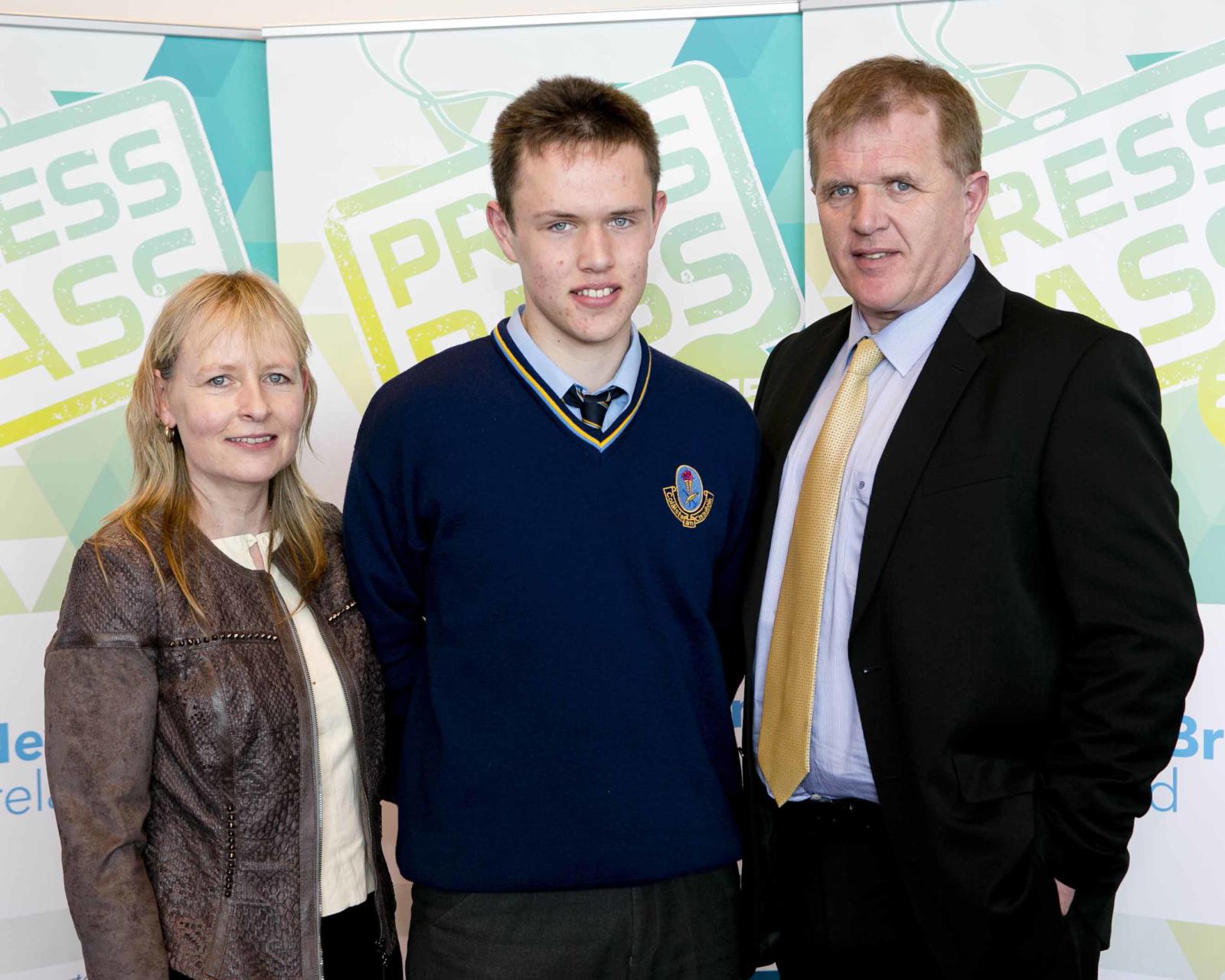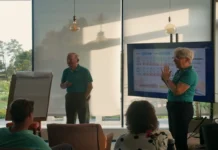For his essay on the increasingly results-driven nature of sport in Ireland, Transition Year student in Coláiste an Chraoibhín Eoin Hartnett, achieved first place in the opinion category of the National Newspaper of Ireland Press Pass writing competition, announced at the Dublin Convention Centre last week.
The 16-year-old’s essay (see end of story), titled ‘Sport As We Never Knew It’, laments on the changes in attitude to sport over time and the stark differences between the childhoods of those growing up 30 years ago and of those growing up today.
Eoin’s essay was inspired by a conversation with his father, who described the carefree attitude he and his friends took to sport when they were younger. Rather than playing sport for the pure enjoyment – in the streets with tin-cans or in fields with jumpers for goalposts – he points out that today, sport has become fixated on achieving goals and winning, which on the whole has taken away from the fun of playing and participating.
Speaking to The Avondhu, Eoin outlines why he wrote about this particular topic: “I wanted to show the changes that sport has gone through, and how injuries and technology have become more of a problem today.
“Also the widening rift between those on computer games and those into sport – and how it was those in between that got left behind. How the fun of the game has gone out of it a bit.”
In his essay, Eoin makes the argument that while social media is supposed to connect people with each other, instead it has widened the gulf between those who ‘live and breathe sport’ and those ‘who spend every waking hour on social media’. And it is those, he argues, in the middle ground that has suffered the most from the increasingly competitive nature of sport.
“They have no incentive to join a club when they know they won’t make it onto the starting team.”
“Those people, who would have an interest in sport, but lack the talent. There is no place in sport for these people, and that’s the problem. They have no incentive to join a club when they know they won’t make it onto the starting team. This surely is a clear sign that a lot more emphasis during training should be placed on the fun, enjoyment and participation of sport,” he writes.
Eoin’s success follows that of Elmarie O’Brien, who last year finished third in the features category of the Press Pass competition, for her essay ‘Drive’. In their report, the judges lauded Eoin’s essay for ‘deploying a mix of rich colour, nostalgia, pathos and razor-sharp analysis’.
REPORT
Their report in full reads: “Growing up in Ireland has changed beyond recognition. There are many new challenges and uncharted waters for the next generation to navigate. Thankfully, many things remain the same, including the bond between father and son, cemented by a shared passion for sport.
“This author offers the reader a privileged glimpse into a conversation with his dad about a bygone era when children would be out with a hurley at the crack of dawn.
Deploying a mix of rich colour, nostalgia, pathos and razor-sharp analysis, it is only when the writer is being driven to training that he realises the streets that would have been bustling with children decades before, are now deserted. His observation coincides with a ping on his mobile phone, inviting him to play FIFA soccer on a games console later that day.
“Which generation had it better? The winner of this category, Eoin Hartnett of Coláiste an Chraoibhín, Fermoy, thinks he has the answer. Well done Eoin.”
ESSAY
Sport As We Never Knew It
By Eoin Hartnett, Coláiste an Chraoibhín, Fermoy
The morning dawns clear and bright. No better incentive to look forward to training. As I am getting my gear-bag ready my Dad gives me a look of exasperation and starts reminiscing about how they used to train.
“First off we didn’t pack a gear-bag, we just grabbed our hurleys and off we went. In the mornings there would be lots of children outside for a last minute kick-about or last couple of pucks before going to school and in the evenings we would go to a field, or any green patch of ground that resembled a field, to play a couple of practice matches. The evenings we didn’t go to a field we played soccer on the road through our estate. That was our training! Weekends were always the best. From dawn to dusk or thereabouts everybody joined in no matter what the sport. Jumpers were used for goalposts and if we couldn’t find a football we used a tin-can.” This, coming from a man who has won several All-Ireland hurling medals and who has competed successfully for Ireland on the international stage in athletics, makes me wonder if all the rigorous training endured by the children of today is as effective as the fun and games played by children in my Dad’s generation.
Now as I am putting my gear-bag in the car I notice, for the first time, how quiet the street is. It is just after ten o’clock so most children should be up and about. I had always thought it normal but now after listening to my Dad I realise that it was not always this way.
As I am being driven to training I look out my window and gaze at the deserted streets of several estates and wonder how this could be. But before I could get any time to contemplate this enigma my phone beeps. A text from one of my friends ‘hey Eoin, you up for a game of FIFA later.’ As I read this text I realise this is one of the reasons for empty streets – computer games and modern technology. Another possible reason would be that the streets are not as safe as they used to be. Parents are less likely to let their children go out without any supervision. With a touch of nostalgia for something I have never known I realise that twenty or thirty years ago, instead of a text asking to play an xbox game or something similar, there would have been a knock on the door by a friend with a soccer ball, hurley or a tennis racquet in his hand, calling to see if I wanted to come out and play. A tradition effectively destroyed by Facebook and Twitter and other social networking sites. Social media is supposed to connect everybody together but instead it has widened the gulf between those who spend every waking hour on social media and those who live and breathe sport. But it is those in the middle ground that have truly suffered. Those people, who would have an interest in sport, but lack the talent. There is no place in sport for these people, and that’s the problem. They have no incentive to join a club when they know they won’t make it onto the starting team. This surely is a clear sign that a lot more emphasis during training should be placed on the fun, enjoyment and participation of sport.
Nowadays everything is structured and everything has to fit into a certain timetable, which must suit parents as well. There is no room for any spontaneity. Training must meet certain criteria, it’s all goal orientated, win this, beat that team, achieve a certain ranking, there is no time for any enjoyment. In fact nowadays young adults are presenting with serious injuries, which would have long term effects, and this comes from training too hard at too young an age. In my Dad’s time, there was very little organised training, particularly at a young age. They played any sport they could, wherever they could, and for as long as they could. Dinner and supper were their only interruptions. Back then it was obvious that they played for the sheer enjoyment of playing.
These days, playing sport means hard work and one hundred per cent commitment. I used to believe that this is how sport was meant to be, but now that I know this is not the case I have to wonder which generation had it better. It is an easy question to answer, I think, don’t you?












